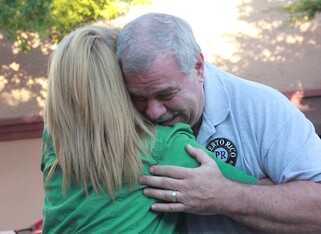
While this might be fiction, the dilemma is not. Many people shy away from the bereaved, or even the sick, because they don’t know what to say. Or, they stay away for fear they’ll say the wrong thing.
If you worry about saying the wrong thing, your fears are justified. Judging from the comments I receive, people frequently say inappropriate things to the sick and bereaved. I sometimes wonder why or how people could possibly say such insensitive things. That is, until I find myself once again in their shoes.
It’s natural to want to console and comfort but this does not come easy when hearing shocking news. And bad news is always shocking because we’re never prepared to hear it. A neighbor’s cancer diagnosis, a baby’s death before birth, a friend’s spouse who dies suddenly, or a loved one requiring emergency surgery. The unexpected can leave me grasping for words.
So what do I do and what might help you when faced with terribly sad and shocking losses? I stop, I focus, and I think before I speak. If I’m face-to-face, I might extend my hand in comfort or give a hug. I might say, quite truthfully, “I’m so sorry,” with an emphasis on the word “so.” I might ask how I can be of help or offer to do something specific, such as making some calls or sending emails to notify others. Before I say anything else, I give myself the time to absorb and process the news.
The one thing I find that truly helps is to let someone know I care. And not too long ago, when I needed support, a dear friend did just that. As our conversation came to an end she closed by saying, “I love you.” It was just what I needed to hear. Maybe someone you know needs to hear it, too.
Robbie Miller Kaplan is an author who writes from a unique perspective as a mother who has lost two children. She has written How to Say It When You Don't Know What to Say, a guide to help readers communicate effectively when those they care about experience loss, available in ebooks for "Illness & Death," "Suicide," "Miscarriage," "Death of a Child," "Death of a Stillborn or Newborn Baby," "Pet Loss," "Caregiver Responsibilities," "Divorce" and "Job Loss." All titles are in Amazon's Kindle Store.









 RSS Feed
RSS Feed
